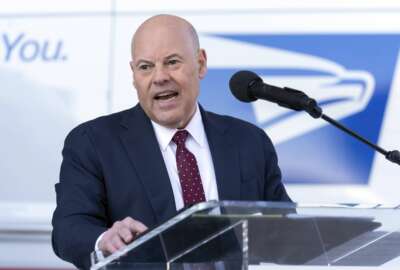NTEU expresses concerns about telework, budgets and DEI issues
On today's Federal Newscast: A union for feds sounds the alarm about telework, budgets and DEI issues. What does it mean that agencies improperly paid out more than...
- The Pentagon’s getting some congressional scrutiny over its sudden decision to cancel a new travel management system, called MyTravel, that had been in development for the past several years. Rep. Nancy Mace (R-S.C.), who chairs the House subcommittee that oversees federal IT, said she plans to call DoD’s top personnel official to testify about the cancellation of MyTravel in a hearing later this month. The department spent at least $23 million on the program, before cancelling it last month with almost no explanation.(Mace Probes DoD’s Cancellation of Contract Modernizing Defense Travel System; Sends Requests for Testimony at Upcoming Hearing - House Committee on Oversight and Accountability)
- Schedule F could make a comeback if a Republican president steps into office, but advocacy groups are calling for more long-term reforms. The Trump-era executive order attempted to reclassify about 50,000 federal employees to make them easier to fire if performing poorly. The now-revoked order was never implemented, but former President Donald Trump has already promised to revive the order, or a similar policy, if elected. Although officials at the non-profit Partnership for Public Service agree there is a need for civil service reform, they said there is a better path forward. The Partnership is advocating for a constructive and collaborative approach to improving performance management of federal employees, and warning against managing by executive order.(Divide over Schedule F reveals deeper need for federal workforce reform, Partnership says - Federal News Network)
- The Postal Service’s regulator is calling on the agency to shed more light on its network modernization plans. The Postal Regulatory Commission insists USPS provide more details on changes to its facilities and operations, including how these changes may cut costs or impact its level of service to the public. The commission is rejecting a motion from USPS to withdraw its inquiry into changes in its delivery network. The regulator is also asking USPS to specify how it expects to achieve $34 billion of cost savings outlined in its 10-year reform plan. Postmaster General Louis DeJoy said USPS is looking to grow its package business as part of its modernization efforts. “Achieving this goal will set the Postal Service on the path to a bright future,” DeJoy said.(USPS previews ‘massive-scale’ changes, but regulator demands more details - Federal News Network)
- The Department of Veterans Affairs is trying, once again, to modernize its supply chain systems. For the fifth time since 2004, VA has a plan to bring in modern technology to manage its medical supply chain. The agency released a solicitation for a systems integrator to oversee a "systems of systems" approach to supply-chain technology modernization. Previous attempts to modernize VA's supply chain have failed, including most recently in 2020, when the agency gave up on implementing the Defense Logistics Agency's system. This latest effort to attempt to consolidate and integrate approximately 63 disparate systems across 171 sites, begins with proposals being due July 18.(VA supply chain modernization RFP - Sam.gov)
- All TSP funds, with the exception of the fixed income index F fund, posted positive returns in June. This is a stark contrast from May's returns, which showed most funds in the red. Funds like the common stock index C fund and small cap stock index S fund posted significant returns in June. As of June, all funds are in the black for year-to-date returns. All funds except the F fund are in the positive for 12-month returns, and Lifecycle funds were all in the black this month.(Most TSP funds in the black in June - Federal News Network)
- The National Treasury Employees Union is raising concerns about several draft appropriations provisions that, if enacted, could impact federal employees. For one, the federal union is opposing the inclusion of the SHOW UP Act in House Appropriations draft legislation, which would return feds to pre-pandemic telework and remote work policies. NTEU is also voicing concerns about potential budget cuts for some agencies, as well as a possible prohibition of the executive order on diversity, equity and inclusion in the federal workplace. Both of these provisions are included in the House's Financial Services and General Government draft spending bill. The Appropriations Subcommittee advanced the bill last week, which now moves to the full committee for consideration.(House Appropriations bills threaten funding, telework - National Treasury Employees Union)
- The Air Force Research Laboratory is taking steps toward autonomous air traffic control at Eglin Air Force Base in Florida, with its new un-crewed aircraft system traffic management (UTM). The testing phase will focus on evaluating the UTM's capabilities for communication and security, as well as low-altitude weather, and beyond visual line-of-sight operations. The system controls takeoffs and landings for unmanned aircraft and drones. As the project progresses, the Air Force will look to public-private partnerships to further develop the system.
- Agencies improperly paid out more than $247 billion in fiscal 2022. The latest figures from the Government Accountability Office show that is $35 billion less than what agencies paid out in 2021. Additionally, auditors said 19 programs across eight agencies did a better job of managing their payments and reduced the total dollars paid out improperly by almost $11 billion last year alone. The Department of Veterans Affairs saw the biggest reductions in its improper payment rate across several programs, including an 85% change in its community-care initiative.
- The Defense Department has multiple ways to fast-track funding for research and development, but it isn't always taking advantage of those pathways, according to the Government Accountability Office. Standard DoD practice involves a request-and-allocation process that takes about two years. Congress granted the Pentagon at least 26 pathways to get money flowing to support early research that would not otherwise receive funding. The GAO said DoD needs to do a better job of letting its components know how to use flexible pathways.
- The IRS is looking to beta-test a free, online tax-filing platform that is run by the agency during next year’s filing season. But House and Senate Democrats want to know how soon the IRS would roll out this direct-file platform to every taxpayer. Sen. Elizabeth Warren (D-Mass.) is leading nearly 40 senators and more than 60 House lawmakers in asking the IRS for this update. About 70% of taxpayers qualify for the current Free File program supported by private tax-preparation companies, but only 2% filed through the program last year. The IRS estimates the average American spends $140 and eight hours filing annual tax returns. (Letter to IRS Commissioner Danny Werfel - Sen. Elizabeth Warren (D-Mass.))
Copyright © 2024 Federal News Network. All rights reserved. This website is not intended for users located within the European Economic Area.
Peter Musurlian
Peter Musurlian is a producer at Federal News Network.
Follow @PMusurlianWFED






